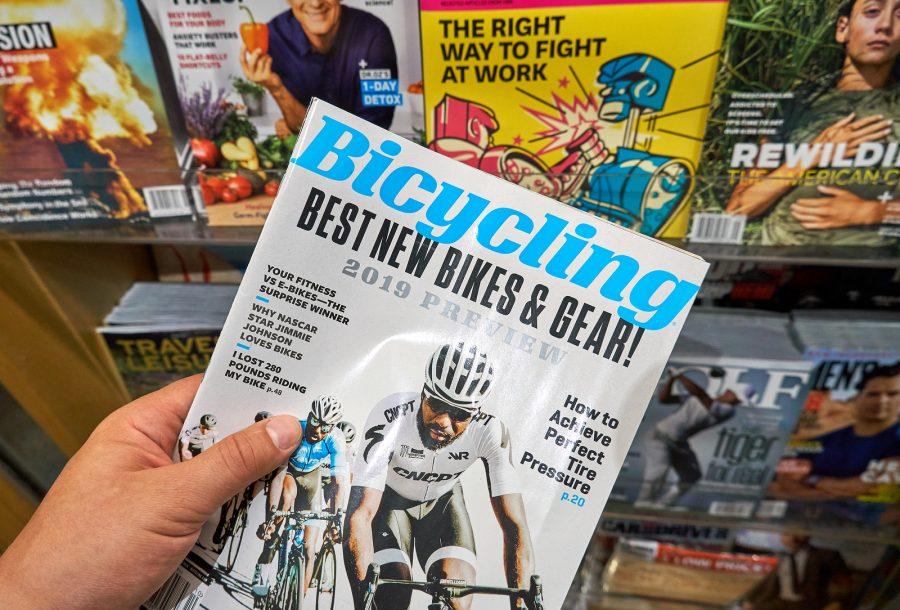Interview: Former Media Executive Talks Journalism
December 10, 2019
“In a weird way, Trump and the media business, in terms of the news media business, have an oddly symbiotic relationship.”
Earlier this year, I interviewed David Carey. He is currently a Fellow at Harvard University’s Advanced Leadership Initiative, which according to the programs web site is “designed to prepare experienced leaders to take on new challenges in the social sector where they potentially can make an even greater societal impact than they did in their careers.”
Before he entered this program, Carey was the chairman of Hearst Magazines, a major magazine group that owns magazines including Elle, Esquire, Cosmopolitan, Harper’s Bazaar, and Marie Claire. Earlier, he worked at Condé Nast, where as publisher of the The New Yorker he worked to bring the magazine back to profitability.
The following is a selection of questions and the ensuing conversations from the transcript of the interview.

Munkacy: Can you briefly explain your job before you did the Harvard program or your jobs?
Carey: I’ve spent 35 years in the magazine business. I started in a junior role with Esquire Magazine back in 1985, and grew up by taking on complex projects in the companies I work for. I would be the one who would gravitate towards those hairy, potentially failing parts of the company and seeing if I could potentially help fix them.
I worked at the Hearst Corp, so I started off at Esquire. Esquire was acquired by Hearst. I worked for Hearst for another 8 years, so basically 10 years, essentially. Then I worked with Condé Nast for 15 years, another big private company.
I was publisher of The New Yorker for about half the time there. Then I returned back to Hearst as the president in 2010. I retired in 2018.
Munkacy: You’ve been in the industry for a while. How is the transition from print to lots and lots of online subscriptions and lots of online publishing changed your job specifically?
Carey: First of all, the business is always in perpetual change. In so many ways, the business six or seven years ago seemed simple compared to the complexity today. When I was in the business six or seven years ago, it still seemed complex relative to six or seven years before that.
The change is a constant. It goes back to the beginning of time. One of the great old sayings back in 1895 that the person who led the patent office for the US government in 1895 suggested they close the patent office. They believed that anything that could possibly be invented had actually been invented by 1895, and that there was no future innovation.
Quick, tell me 10 things the world needs. Quick, Munkacy, tell me now. What are they?
Munkacy: Healthcare for everybody, education for everybody.
Carey: Think about products. Think about physical products.
Munkacy: Products?
Carey: What is missing in your life?
Munkacy Something to cure every disease.
Carey: Keep going. What physical item? What consumer item? If you look around your house, you think what’s there, what do you think you really need? Quick, come on, Munkacy. Fast, tell me.
Munkacy: A robot that brings me food from downstairs. [laughs]
Carey: You have to really stretch. You look around your current home and it’s hard to imagine exactly what you need. The truth is, 20 years from now, thinking back on this time, and you’ll realize how you possibly lived in the centipede age. Do you have an iPhone 7 or 8
Munkacy: 6 Plus.
Carey: 6 Plus. This phone, in 10 years, will look like the equivalent of a tin can on a string. When you first got that phone, it was cutting-edge modern. I have the XS Max. Cool, big. This will seem like a brick in the future. That is just the nature of constant change innovation.
What does it mean for the media business? It means that you’re constantly managing an ever-changing nature of business. How you do business, the revenue you get, how you run your organization. The companies that succeed are those that are very flexible in managing change.
The companies that fail that are rigid, try to stay rooted in the present, and not embrace the future. Those companies usually don’t make it.
Munkacy: It’s such a different change. Yes, the iPhone can change from the iPhone 1 to that. That’s a relatively big change. From print that’s being 100 percent of your sales 60 years ago to now, I don’t know what the sales number is for print, but hit…
Carey: 60-40, whatever it is.
Munkacy: 60-40, that’s a big change.
Carey: Yeah. What it means is that you have to be good at many things. It means you have to have great dexterity as an organization. This is true from the leadership down to the entry level kids that you’ll be leaving not too distant future, is you have to be good at lots of things.
It used to be managing three or four revenue lines. You now have to be good at managing 15 revenue lines. It’s all possible. It’s all there. It just means that you need to have a lot of personal breadth in terms of how go through those things.
Munkacy: Now the obligatory Trump era question. Can you briefly explain the differences in your life in the Trump era versus the pre-Trump era?
Carey: On a personal basis, while I may not agree with anything the president’s administration, on a personal basis, Trump hasn’t meant anything to me. Either the tax is up or down or sideways, but it hasn’t meant anything to me.
In a weird way, Trump and the media business, in terms of the news media business, have an oddly symbiotic relationship. He creates nine news cycles a day, and the media reports on it. The media attracts audiences that are turning to the media to help decipher this constant churn that surrounds us.
For the media brands, newspapers, magazines, TV stations that are on the political view and have done a good job, they’ve seen record high levels of audience. Every year, there’s like 12 more things that happen.
At the same time, Trump has inspired a huge resurgence of young journalist. There’s a group of young Woodwards and Bernsteins who look at this current divided era. They want to help tell the story to people to understand.
Despite all, at times the craziness of the White House, it does feel that Trump is in a net positive for the field of journalism. That’s underappreciated, under-reported. If there had been a normal candidate who didn’t make as much news, who didn’t have quite as much, you’re churning both…
You’ve got a divided world. You have Trump’s approval rating among Republicans at 90 percent. The Democrats and like 20 percent. That fracture creates a lot of interesting moments for journalism.
If there had been someone who was middle of the road, reasonable historic levels of support, I don’t think the news media would be doing as well. It wouldn’t be as invigorated, nor would the audiences be. In a strange way, it’s been a good…he’s done a great deal for journalism.
Munkacy: Do you have trust in the media? 50 years ago, Walter Cronkite was the most trusted man in America. The New York Times was the Bible of truth, things like that. I feel like that’s changed a little bit. The President attacks them.
This is not just the President, but people from all sides of the political spectrum attacking the other side. For instance, you’ve seen a rise in Breitbart or the Huffington Post, things that aren’t necessarily news media as much as political arguments presented as facts.
All of this is not new, but Trump has exacerbated it so much
Carey: The right and the digital media has changed the news media business regardless of whether Trump got into the race and won or not. There used to be what’s referred to as barriers of entry. Have you heard that phrase?
If you had a business, you’d want a business that would be hard for other people to enter into. If you and six of your friends wanted to start a company to manufacture cell phones, that would be hard.
You have to have engineering expertise, manufacturing expertise, all of the above — that barrier to entry, which would be very high. If you and six of your friends decided to start a young person’s news business, digital-only, you could start that business on Saturday
You’d buy the URL on GoDaddy. You’d get a web hosting deal. You’d get some rudimentary publishing tools. You can get any business.
The truth is that some of the kids, these small enterprises may get it right. The news media business was destined to change once the barrier to entry went to zero regardless of who was in the White House.
If anything, I would argue about what Trump has done is put a bit more premium on the trusted brands versus the BS brands that have long-existed out there.
For example, for some time, BuzzFeed was seen as important as The New York Times with some people before Trump. I don’t think anyone thinks that today.
There was a time the BuzzFeed was just the news you need, you had the articles and everything else. You’ll be seeing this incredible news source until the need for even more reputable news got much deeper, and then it changed.
The current environment favors brands that people know have real authority.

























































